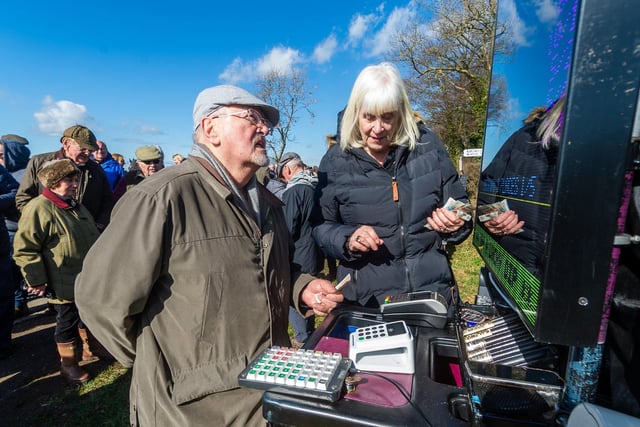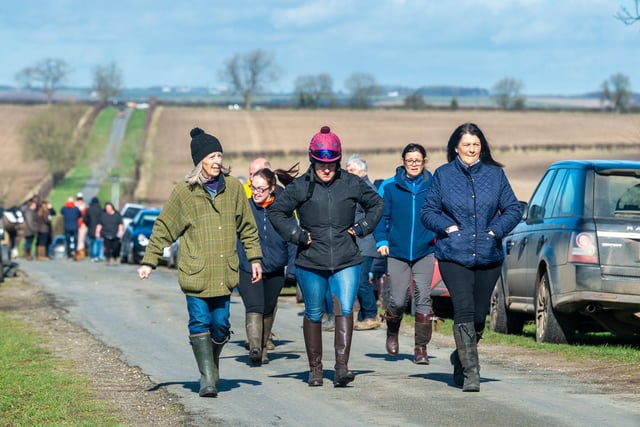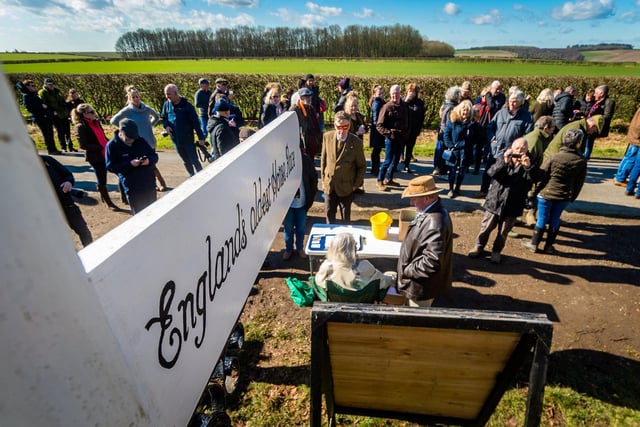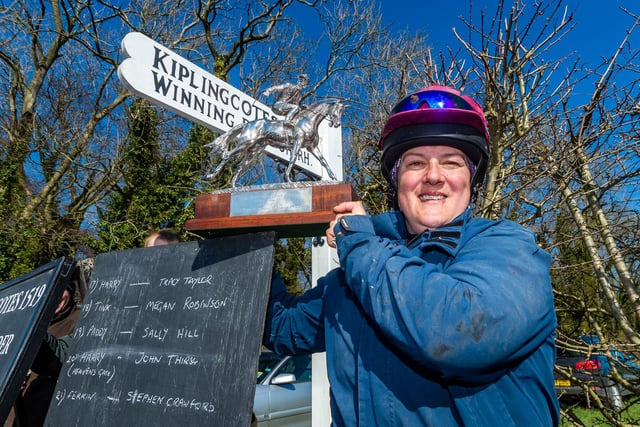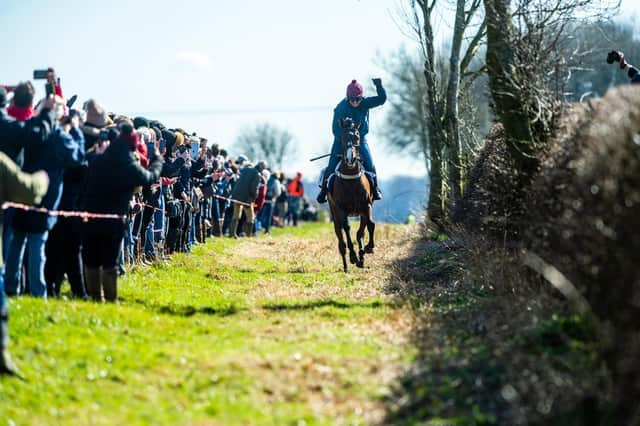Sally Hill, from Lockington, won the Kiplingcotes Derby in 2011 and repeated the feat yesterday on 5/2 favourite Paddy, a one-time point to pointer.
For the last two years during the pandemic four-time winner John Thirsk and Stephen Crawford kept the five-centuries old tradition alive by completing the route, albeit in a gentler fashion than usual.
The course, near Middleton-on-the-Wolds, takes in four miles of grass verge, Tarmac road, disused railway bridge and ploughed field and finishes on a grass verge after crossing the main Bridlington road.
An assortment of horses and riders took part yesterday including a former racehorse once owned by the ruler of Dubai Sheikh Mohammed, cobs, a Shire horse and two women riding side saddle.
Ms Hill, who rides out for trainer Mike Sowersby at Malton, said she had been waiting her chance to compete during the pandemic and had been a “bag of nerves” at the start.
However she said her mount Paddy had behaved as well as she had hoped.
She said: “He was good, he listened, he went where I wanted him to go, he did really well.”
Racing historian Chris Pitt, who has been coming for 30 years and says he doesn’t go to Cheltenham “because it’s too crowded”, said traditions like Kiplingcotes “should never be allowed to die out.”
He said: “It got a lot more popular after Julia Bradbury featured it on Countryfile in 2021, and there was big publicity about the 500th race three years ago, so more people knew about it.
“The fact no one came for two years means they’ve come today in big numbers.”
The first Kiplingcotes Derby is said to have been held in 1519, although the first recorded race was not until 1555.
The winner gets prize money of less than £100 - the interest on an endowment provided by “five noblemen, 19 baronets and 25 gentlemen”. Quirkily, though, the second-placed rider usually wins more since they are awarded the entrance fees.
It is held on a makeshift course and any mount or rider can enter.
The race had only been cancelled three times in its entire history before the Covid-19 pandemic - and all were in living memory. In 1947, it was called off due to huge snow drifts during one of the harshest winters on record, and in 2001 it was halted due to the foot and mouth disease outbreak. In 2018, severe damage to the course by off-roaders led to it being 'walked' by a single rider to maintain the tradition.
It still went ahead in 1666 - the last year there was a major outbreak of bubonic plague in England - and in 1918 and 1919, when the country was ravaged by the Spanish flu pandemic.
The traditions of the Derby - one of the most eccentric races in the equestrian calendar - dictate that if no rider participates, then it cannot be held the following year. A steward has contested the race as a lone rider on the three occasions it has been cancelled to ensure it can continue in future.
The Kiplingcotes Derby is unique - it's a chase across the flatlands of East Yorkshire that's been called 'the Brigadoon of racing' because the course reverts to farmland after the race is run until the next year.
Former racehorses can often be seen alongside working hunters, ponies and even Clydesdales. It's always held on the third Thursday of March at 11am.
The course is four miles across tracks and fields, beginning from the former Kiplingcotes Station site in Etton, near Market Weighton. It finishes at Londesborough Wold Farm. A clerk is paid 25p annually for maintaining the route.
The delightfully eccentric competition has few rules. Horses of any age can be ridden and the oldest jockey was 74. Former racehorses are often entered under fake names - a practice that's accepted as a quirk of the Derby. Any type of mount can take part, from ponies to shire horses. Many of the jockeys are recreational riders from the local area who simply fancy their chances, and outsiders have been known to win. The names of the riders are not declared until the day of the race - there are no advance entries, you just muster at the starting post on the day.
You can place bets - but there's only one bookie. Because Chris Johnson doesn't know anything about the horses until race day, he has to estimate their condition and pedigree before calculating his odds.
Horses have been known to die during the tough race. In 1997, the winning mare, Sunny, collapsed and died immediately after finishing. The runner-up, Burt, also died moments after the finish in 2002.
Founders the Witty brothers were present at the first race in 1519 and their descendants were still riding in it in the mid-19th century. In 2019, Wittys from Canada attended the 500th anniversary event on their ancestors' land.
